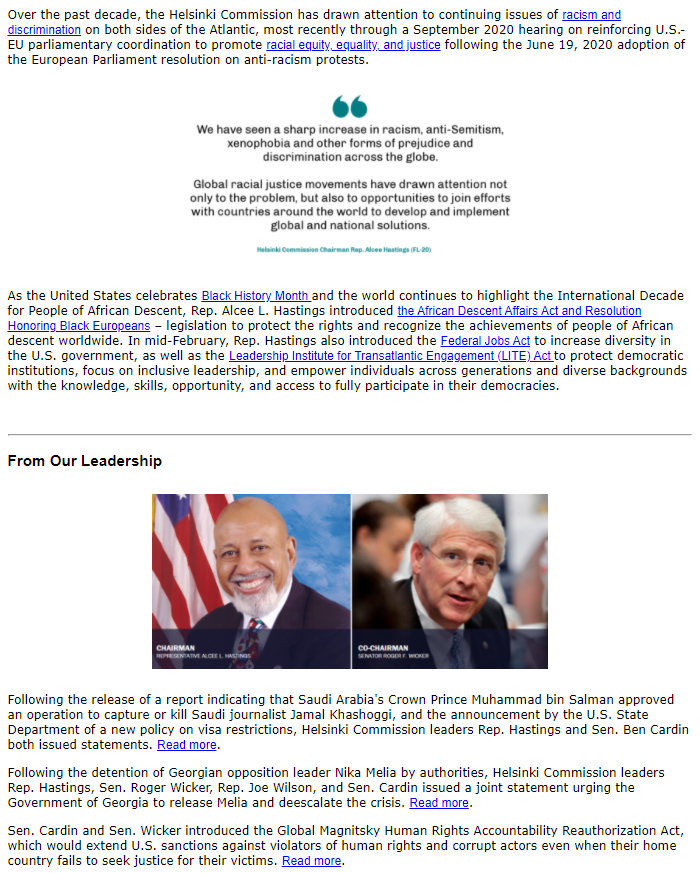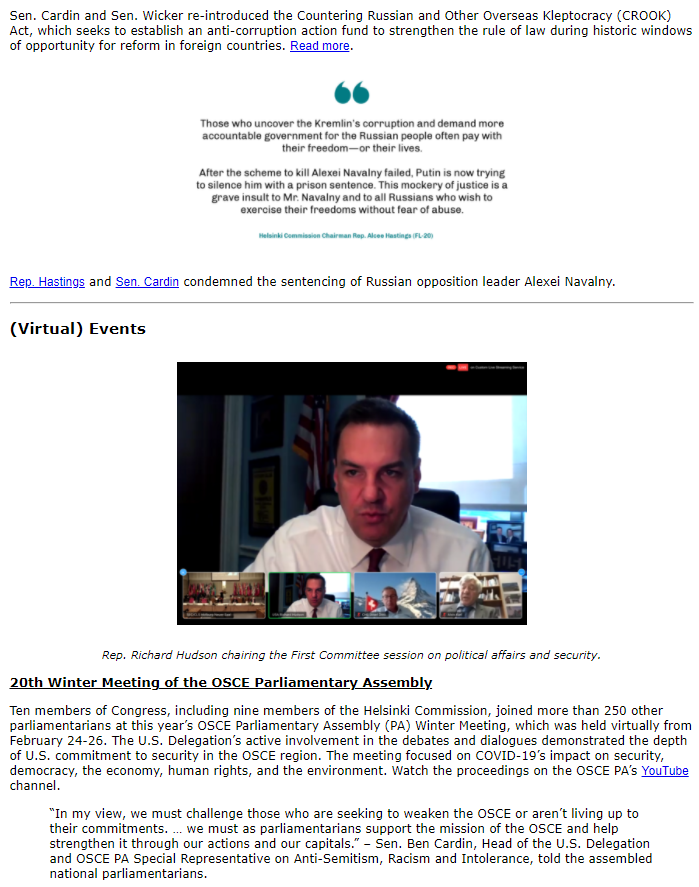Relevant Issues
Relevant Countries
Leadership
Publication category
Georgian Dream’s Escalating Crackdown on Dissent
Feb 11, 2026Since October 2024, Georgian Dream, Georgia’s ruling party, has plunged the country into its worst human rights crisis since independence. They have passed more than 20 new laws that expand […]

Ranking Member Cohen Condemns Sentencing of Hong Kon...
Feb 09, 2026WASHINGTON—Congressman Steve Cohen (TN-9), the Organization for Security and Cooperation in Europe Parliamentary Assembly’s Special Representative on Political Prisoners, strongly condemns the 20-year prison sentence handed to media tycoon and […]

Helsinki Commission Ranking Member Cohen Celebrates ...
Aug 01, 2024WASHINGTON—Congressman Steve Cohen (TN-9), the Organization for Security and Cooperation in Europe’s 56-nation Parliamentary Assembly’s Special Representative on Political Prisoners, today welcomed news that three journalists and Paul Whelan, wrongly […]

Helsinki Commission House Leadership Marks Fourth An...
Jun 06, 2024WASHINGTON—Today, Chairman Rep. Joe Wilson (SC-02) and Ranking Member Rep. Steve Cohen (TN-09) marked the fourth annual Counter-Kleptocracy Month. The U.S. Helsinki Commission has marked Counter-Kleptocracy month since June 2021 […]

Helsinki Commission Advances Human Rights, Demands f...
Oct 19, 2023By Shannon Simrell, Senior Policy Advisor Between October 2-13, 11 Helsinki Commission staff joined approximately 1,400 representatives of OSCE participating States (pS) and civil society representatives in Warsaw, Poland in […]

Vladimir Kara-Murza: Putin’s Personal Prisoner
Sep 20, 2023Stream here: HEARING: Vladimir Kara-Murza: Putin’s Personal Prisoner – YouTube Vladimir Kara-Murza, a father, husband, and a freedom fighter, has been in detention for over five hundred days and is currently […]

Russia’s Alpine Assets: Money Laundering and S...
Jul 18, 2023Switzerland has for years been a primary destination for Russian money laundering and, since the Russian invasion of Ukraine, a weak link in Western sanctions enforcement. This Helsinki Commission hearing […]

United States Demonstrates Global Leadership on Ukra...
Jul 14, 2023The Helsinki Commission’s four senior leaders helmed the United States’ bicameral, bipartisan delegation to the 30th Annual Session of the OSCE Parliamentary Assembly last week in Vancouver, Canada. Co-Chairman Senator […]
Helsinki Commission Chair and Co-Chair Lead Delegati...
Jul 10, 2023WASHINGTON—Helsinki Commission Co-Chair Senator Ben Cardin (MD) and Helsinki Commission Chair Representative Joe Wilson (SC-02) led a bipartisan Congressional delegation to the 30th Annual Session of the OSCE Parliamentary Assembly (OSCE […]
Hearing: Supporting a Democratic and Secure Moldova
Jul 06, 2023Wednesday, July 12, 2023 2:00 pm Cannon House Office Building, Room 210 Live stream: https://www.youtube.com/watch?v=jm-R6rfQbCo In recent years, Moldova has enacted numerous reforms under current Moldovan President Maia Sandu to […]
Helsinki Commission Leadership Celebrate Pardon of N...
Jun 23, 2023Washington—Today, the Chairman and Ranking Member of the Commission on Security and Cooperation in Europe, also known as the U.S. Helsinki Commission, Representative Joe Wilson (SC-02) and Ranking Member Steve […]
Chairman Wilson and RM Cohen Mark Third Annual Count...
Jun 16, 2023WASHINGTON—Today, Helsinki Commission Chairman Joe Wilson and Ranking Member Steve Cohen, Co-Chairmen of the Counter-Kleptocracy Caucus, marked the third annual Counter-Kleptocracy Month. “Foreign corruption and kleptocracy is the main reason […]






